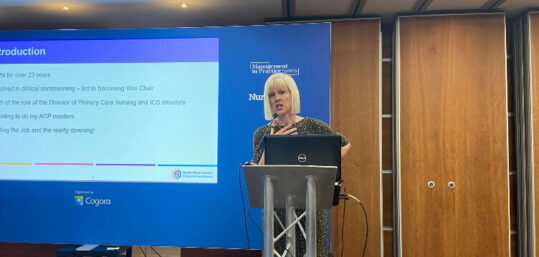General practice nurses urged to ‘diversify and future proof’

General practice nurses (GPNs) should consider how to ‘future proof’ themselves amid the growing role of nursing associates and other health professionals within the sector, an exclusive Nursing in Practice conference has heard.
She urged GPNs to think about ‘diversifying’ and make known any specialist skills or interests they have.
Related Article: QICN bids farewell to Dr Crystal Oldman as she retires from CEO role
‘I think that the days of the general GPN are numbered,’ said Ms Andreae.
‘Within this type of role, we now have nursing associates working and they are doing more and more. I don’t want to depress you all, but things are moving in this direction.’
She added: ‘You have got to think about diversifying yourself and think about ‘what am I going to do that with future proof myself’.
Related Article: RCN to offer ‘safe space’ to discuss Supreme Court ‘sex’ ruling
‘Please think about your role and about your future. If you’ve got a passion, and there is a disease that you have expertise on then put that out there in the primary care network (PCN) and make sure you are known in the PCN.
‘Other people can do clinical work but no one can replicate that knowledge that we’ve got that enables us to do holistic care.’
Ms Andreae also said that GPNs had a ‘real role to play’ in providing a single point of contact for a patient.
Related Article: ‘Concerning acceleration’ in drug-resistant gonorrhoea ahead of vaccine programme
‘If you have a patient that says that you are amazing and that they want to see you again, then that is fantastic.
‘It doesn’t mean that you have to be able to do every part of their care but it does mean that you can connect them to the people who can provide that care.’

See how our symptom tool can help you make better sense of patient presentations
Click here to search a symptom




